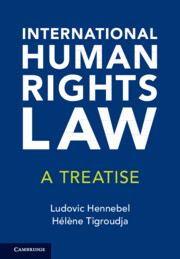Book contents
- International Human Rights Law
- International Human Rights Law
- Copyright page
- Dedication
- Contents
- About the Authors
- Acknowledgments
- Note on the Text
- Table of Cases
- Abbreviations
- Part I Foundations of International Human Rights Law
- Title 1 Theoretical Elements of International Human Rights Law
- 1 The Elusive Theory of Human Rights
- 2 The Idea of Human Rights
- 3 Exploring the Elusive Foundations of Human Rights
- 4 The Pragmatic Approach of International Human Rights Law
- Title 2 Normative Pluralism in International Human Rights Law
- Title 3 The Relationship Between International Human Rights Law and Other Branches of International Law
- Part II The Machinery of International Human Rights Law
- Part III The Interpretation of International Human Rights Law
- Part IV Remedies and Implementation of International Human Rights Decisions
1 - The Elusive Theory of Human Rights
from Title 1 - Theoretical Elements of International Human Rights Law
Published online by Cambridge University Press: 10 April 2025
- International Human Rights Law
- International Human Rights Law
- Copyright page
- Dedication
- Contents
- About the Authors
- Acknowledgments
- Note on the Text
- Table of Cases
- Abbreviations
- Part I Foundations of International Human Rights Law
- Title 1 Theoretical Elements of International Human Rights Law
- 1 The Elusive Theory of Human Rights
- 2 The Idea of Human Rights
- 3 Exploring the Elusive Foundations of Human Rights
- 4 The Pragmatic Approach of International Human Rights Law
- Title 2 Normative Pluralism in International Human Rights Law
- Title 3 The Relationship Between International Human Rights Law and Other Branches of International Law
- Part II The Machinery of International Human Rights Law
- Part III The Interpretation of International Human Rights Law
- Part IV Remedies and Implementation of International Human Rights Decisions
Summary
Explores theoretical foundations, philosophical challenges, and epistemological issues in human rights law. The concept of human rights requires a deep theoretical exploration to understand that all individuals possess fundamental rights irrespective of their nationality or social status. The establishment of international human rights law faces skepticism due to its philosophical indefinability and potential inconsistencies. Scholars often describe the legal framework but avoid deep philosophical inquiries, which creates an epistemological disconnect between philosophy and law, and between law and justice. This chapter aims to bridge these gaps by delving into the elusive theory of human rights, examining how different philosophical perspectives can influence the understanding and application of human rights law. It argues for the necessity of integrating philosophical discourse with legal analysis to achieve a coherent and just human rights framework.
Keywords
- Type
- Chapter
- Information
- International Human Rights LawA Treatise, pp. 5 - 7Publisher: Cambridge University PressPrint publication year: 2025

